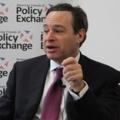Georgetown University Law Center, Washington, D.C.
13th Annual Immigration Law & Policy Conference
Multimedia Tabs
|
Morning Keynote (9:00 to 9:40 am):
|
Lunchtime Keynote (12:05 to 12:40 pm):
|
|
|
Alejandro Mayorkas |
Dick Durbin |
Panels:
9:40 am Immigration Politics & Policy in 2016: How Will Immigration Electioneering Affect Post-Election Policymaking?
Immigration proved an especially contested battleground during the 2016 Republican primary season and appears likely to be a top-tier issue in the general election, amid striking contrasts in policy and tone between the two major political campaigns. This session will explore the role immigration is playing in the campaigns and politics of the election, focusing in particular on the stances of the presidential nominees and other leading voices. How will a new Congress and administration move forward, given the complicated political dynamics within each party? What is each presidential candidate likely to do in his or her first 100 days? And what will the legislative landscape for immigration action look like in 2017? Panelists explore these and other pressing questions.
 |
 |
 |
 |
 |
| David Frum Senior Editor, The Atlantic |
Rosalind Gold Senior Director of Policy, Research and Advocacy, NALEO Educational Fund |
Frank Sharry Executive Director, America's Voice |
Karen Tumulty National Political Correspondent, The Washington Post |
Doris Meissner Senior Fellow and Director of the U.S. Immigration Policy Program, MPI |
11:00 am Family Detention, PEP, and Prosecutorial Discretion: Developments in Immigration Enforcement
Immigration enforcement, always a central component of immigration policy, has received particular focus throughout President Obama’s administration. Regardless of who wins the presidential election in November, enforcement will likely continue to play a large—and contested—role for the next four years. This panel examines three key aspects of current U.S. immigration enforcement: family detention and policies affecting unaccompanied children; the replacement of the Secure Communities federal-local immigration enforcement cooperation program with the Priority Enforcement Program (PEP) amid rising local resistance to cooperation with the federal government; and Department of Homeland Security (DHS) guidance on its use of prosecutorial discretion with regards to deportation decisions. Panelists evaluate the successes and failures of these policies, and consider what legislative and other change could happen in the upcoming year.
 |
 |
 |
 |
 |
| Elizabeth Cedillo-Pereira Senior Advisor to the Director, U.S. Immigration and Customs Enforcement, Department of Homeland Security |
Dree K. Collopy Partner, Benach Collopy LLP Co-Director, Immigration Litigation Clinic, Catholic University School of Law |
Thomas D. Homan |
Stephen Manning Partner, Immigrant Law Group PC and Director, Innovation Law Lab |
Charles Wheeler |
1:40 pm Immigration and the Republican Party: A Dividing Issue for a Divided Party?
Immigration proved a central issue in the 2016 Republican primaries, helping eventual GOP presidential nominee Donald Trump emerge from a crowded field of 17 candidates and solidify his standing with a conservative base that is deeply skeptical about immigration. With the focus now turning to the general election, Republican Party leaders, strategists, and intellectuals from different vantage points—the #NeverTrump, #NeverHillary, pro-business, and libertarian wings of the party— are coming at the immigration debate differently, with differing interpretations of how pivotal immigration will prove to be in attracting or repelling voters and constituencies. This panel delves into the range of views and approaches to immigration that are in play among Republicans and discuss their implications for the next Congress and the future of the party. Panelists discuss the on-the-ground strategy and lessons, their views on where immigration fits in today’s Republican Party, and how the election discourse on immigration is likely to affect the party going forward.
 |
 |
 |
 |
 |
|
Alfonso Aguilar |
Linda Chavez President Becoming American Institute |
Daniel Garza Executive Director The LIBRE Initiative |
Tamar Jacoby |
Josh Gerstein Senior Reporter, covering the courts, justice, and national security issues, POLITICO |
2:40 pm Refugee Resettlement in the United States: The Dawn of a New Era?
More than 65 million people have been forced to flee their homes, including 21 million refugees who have crossed international borders in search of a safe haven. The United States long has accepted more refugees annually for resettlement than any other country, though the numbers represent a tiny portion of those awaiting resettlement around the globe. Yet that historical welcome is under challenge in ways not seen since the immediate aftermath of the September 11th terrorist attacks. In the wake of terrorist attacks in Paris, more than half of the nation’s governors announced opposition to the further resettlement of refugees in their states. And there are calls in Congress for major changes to the resettlement program, which will admit 85,000 refugees this fiscal year, even as defenders note that those under consideration for resettlement undergo more stringent security screening than all other would-be immigrants and travelers to the United States. This panel discusses the policy and legal concerns raised by state and federal lawmakers about the resettlement of refugees, examinse how the federal government and its humanitarian partners have responded to these concerns, and addresses the implications of these challenges for the future of a program that has resettled more than 3 million refugees since 1975.
 |
 |
 |
 |
|
|
T. Alexander Aleinikoff |
Kevin Fandl |
Anna Greene |
Andrew I. Schoenholtz |
4:00 pm Supreme Lack of Clarity: Legal & Political Implications of the U.S. vs. Texas Case and Next Steps
A deadlocked U.S. Supreme Court in June left in place the nationwide injunction barring implementation of the Deferred Action for Parents of Americans and Lawful Permanent Residents (DAPA) program and expansion of the 2012 Deferred Action for Childhood Arrivals (DACA) program, which would have provided deportation relief for up to 4 million unauthorized immigrants. While the decision set no legal precedent, it has left the future of deferred action in the balance: Returning the case to the lower courts where a number of scenarios could play out based on how the Justice Department, the states that brought the challenge, and the presiding appellate and district judges respond. In this discussion, experts discuss what led to the outcome in the case and the choices that the next administration will face. Panelists also discuss the legal challenge's effect on the DACA program and examine the implications for states and the advocacy community.
 |
 |
 |
 |
 |
| Cristina Jiménez Co-Founder and Managing Director, United We Dream |
Stephen H. Legomsky John S. Lehmann University Professor Emeritus, Washington University School of Law; and Former Chief Counsel, U.S. Citizenship & Immigration Services |
David Shahoulian Deputy General Counsel, U.S. Department of Homeland Security |
Rebecca Tallent |
Muzaffar Chishti Director, MPI office in New York, based at NYU School of Law |
- ONLINE REGISTRATION IS CLOSED

![]()



